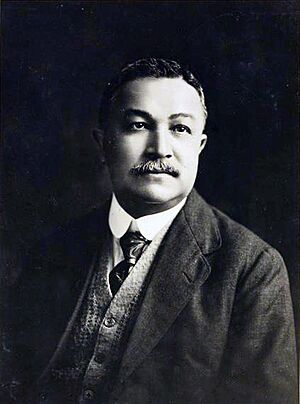José Pedro Braga facts for kids
José Pedro "Jack" Braga (born 1871, died 1944) was an important person in Hong Kong and Macau. He was part of a Macanese family, which means his family had Portuguese roots but lived in Macau for a long time. His family came to Macau from Portugal way back in 1714. Jack Braga's grandfather, Delfino Noronha, started a very successful printing company in Hong Kong. This company, Noronha and Co., printed documents for the Hong Kong Government for many years.
Contents
Early Life and Education
José Pedro Braga was born in Hong Kong on August 3, 1871. He was the eighth child in his family. His father, Vicente Emílio Braga, worked in Japan as a chief accountant for the Japanese Mint and later taught bookkeeping for the Japanese Finance Ministry.
José Braga went to school in Hong Kong at the Italian Convent School and St. Joseph's College. In 1888, he traveled to India to study at St Xavier's College and Roberts College in Calcutta. He did very well in his university entrance exam in 1889, earning the only scholarship available to a European student in that area. However, he could not use the scholarship. Three of his older brothers sadly died from a smallpox disease in Hong Kong. José had to return home to help his grandfather with the family printing business.
Career in Journalism and Business
José Braga worked at his grandfather's company, Noronha & Co., until his grandfather passed away in 1900. In 1895, he wrote a book called 'The Rights of Aliens in Hongkong'. This book criticized how Portuguese people were not given the same chances as others in Hong Kong.
In 1900, he moved to Macau and taught English at a business school for two years. In 1902, a famous businessman named Robert Hotung hired Braga. He became the manager of a newspaper called the Hongkong Telegraph. He held this important job until 1910.
In 1906, Braga also became the Hong Kong reporter for Reuters, a big news agency. He worked for Reuters for twenty-five years, until 1931.
After leaving the Hongkong Telegraph in 1910, Braga started his own business. He became a printer and also imported small Chinese goods. Over the next 20 years, he became a well-known journalist and printer. He was also a respected leader in the Portuguese community in Hong Kong.
Public Service and Recognition
José Braga was very involved in public service. From 1927 to 1930, he was a member of the Sanitary Board, which helped keep the city clean and healthy.
He then made history by becoming the first Portuguese person to join the Legislative Council. This council helped make laws for Hong Kong. He served two terms, from 1929 to 1937.
Braga also worked closely with another important businessman, Sir Elly Kadoorie. He became the Chairman of the Hongkong Engineering and Construction Company from 1930 to 1941. This company developed a large area in Kowloon, which is now known as the Kadoorie Estate. Two roads there, Kadoorie Avenue and Braga Circuit, were named in 1936. One of them is named after him!
He was also on the board of the China Light and Power Company, which provides electricity. He even served as chairman in 1934 and 1938.
José Braga received special awards for his hard work in both Macau and Hong Kong. In 1929, the Portuguese government honored him with the title "Comendador da Ordem de Cristo." In 1935, he was appointed an Officer of the Order of the British Empire (OBE) by the British government.
Family and Legacy
On May 5, 1895, José Braga married Olive Pauline Pollard. They had 13 children together! Their oldest son, José Maria (Jack) Braga, became a famous historian. He wrote many books about the Portuguese people in East Asia.
When Japan occupied Hong Kong in 1941, Braga moved to Macau in 1942. He spent his last two years there writing a book he had planned for a long time. It was called The Portuguese in Hongkong and China.
José Pedro Braga passed away on February 12, 1944, in Macau. He was buried in São Miguel Cemetery.
| Political offices | ||
|---|---|---|
| Preceded by John Cecil Macgown |
Member of the Sanitary Board 1927–1930 |
Succeeded by R. A. de Castro Basto |
| Assembly seats | ||
| New seat | Portuguese Unofficial Member 1929–1937 |
Succeeded by Leo d'Almada e Castro |
 | Delilah Pierce |
 | Gordon Parks |
 | Augusta Savage |
 | Charles Ethan Porter |


